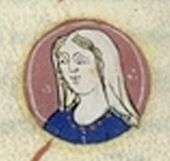Plectrude
Plectrude (Latin: Plectrudis; German: Plektrud, Plechtrudis)[1] (died 718) was the consort of Pepin of Herstal, the mayor of the palace and duke of the Franks, from about 670. She was the daughter of Hugobert, seneschal of Clovis IV, and Irmina of Oeren. She was the regent of Neustria during the minority of her grandson Theudoald from 714 until 718.

Biography
Plectrude was described as politically active and influential upon her husband and his reign. She brought a large amount of property to the Arnulfing house.[2] During the reign of Pepin, she appears as his joint signatory in every legal instrument issued by him that is still preserved, which was unusual for this time period.
Her son Grimoald was murdered in 714. She ensured Pepin II's assent that Theudoald, Grimoald's son, would be his main heir. When Pepin died soon thereafter, she took power in Neustria as regent of the under-age Theudoald. To ensure her reign, she imprisoned Charles Martel, Pepin II's son with his second wife Alpaida, in Cologne. Charles is often said to have been illegitimate, but this is considered by many today an anachronistic interpretation of his status. Charles' contemporaries most likely did not consider him illegitimate, as he was born while his mother Alpaida was married to Pepin the Frank, and noblemen practiced polygamy in this period.[3][4] In 715, the Neustrian nobility rebelled against her in alliance with Radbod of Friesland and defeated her in the Battle of Compiègne, which took place on September 26, 715, causing her to take refuge in Cologne. Cologne was the homeland of her family clan and where she kept Pepin's money.
In 716, Chilperic II, the king of the Franks, and Ragenfrid, the mayor of the palace, led an army into Austrasia, near Cologne, where Plectrude had gone. They defeated her and freed Charles Martel. The king and his mayor then turned to besiege their other rival in the city and claimed it. The treasury shortly after received recognition by the king and mayor.
The juncture of these events favored Charles. In 717, he chased the king and the mayor to Paris before turning back to deal with Plectrude in Cologne. He then took the city and dispersed her adherents. Plectrude entered a convent, and died shortly after in the same year in Cologne, where she was buried in the monastery of Notre Dame which she had founded.
Issue
Her sons by Pepin were:
References
- "Called Bliththrydae by Bede (Ecclesiastical History V.11)"
- "Pippin II (d. 714) extended the family's influence further south by marrying Plectrude, whose family had founded the monastery at Echternach and controlled great tracts of land in the Ardennes and the middle Moselle region." Story, Joanna; et al. (2005). "Charlemagne's black marble: the origin of the epitaph of Pope Hadrian I". Papers of the British School at Rome. 73. pp. 157–190. P. 183
- Joch, Waltraud (1999). Legitimität und Integration: Untersuchungen zu den Anfängen Karl Martells. Husum, Germany: Matthiesen Verlag.
- Gerberding, Richard A. (October 2002). "Review of Legitimität und Integration: Untersuchungen zu den Anfängen Karl Martells by Waltraud Joch". Speculum. 77 (4). pp. 1322–1323.
External links
- http://www.inghist.nl/Onderzoek/Projecten/DVN/lemmata/data/Plectrudis (in Dutch)
- http://www.historici.nl/Onderzoek/Projecten/DVN/lemmata/data/Plectrudis/en